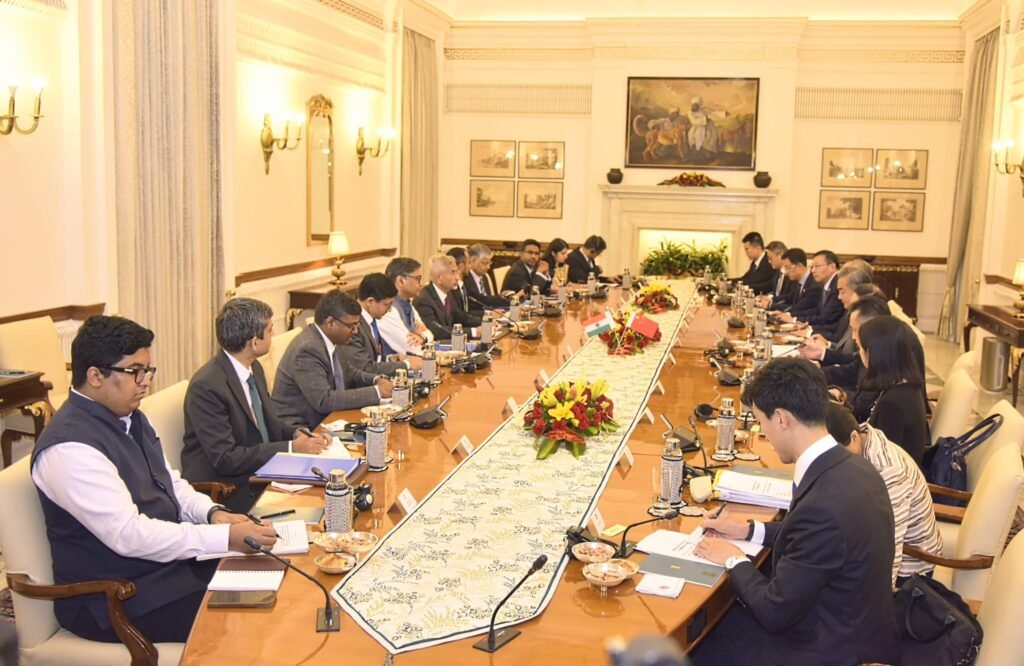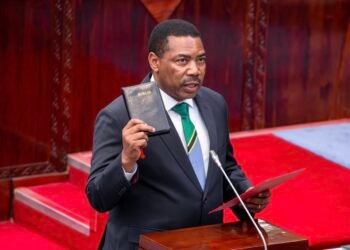NEW DELHI/ BEIJING: When External Affairs Minister S. Jaishankar reminded his Chinese counterpart Wang Yi that India-China relations must rest on “mutual respect, mutual sensitivity, and mutual interest,” he was not merely reciting diplomatic clichés. He was articulating a survival strategy for two of the world’s largest nations locked in both rivalry and interdependence.
Mr. Wang’s two-day visit to Delhi comes at a delicate juncture: just ahead of Prime Minister Narendra Modi’s long-anticipated trip to China for the Shanghai Cooperation Organisation (SCO) summit, and against the backdrop of an increasingly turbulent geopolitical order where India finds itself under simultaneous pressure from both Washington and Beijing.
The core of Jaishankar’s message was clear: differences must not be allowed to harden into disputes, nor competition into conflict. The nuance here is unmistakable. New Delhi recognizes that the relationship has endured its most severe test since the 1962 war, particularly after the deadly Galwan Valley clash in 2020. Trust, shattered on the icy Himalayan frontiers, cannot be rebuilt overnight. But nor can India afford perpetual confrontation with a neighbour that is both its largest rival and, paradoxically, a potential partner in reshaping the global balance of power.
Wang Yi’s response was equally telling: “The basis for any positive momentum in our ties is to maintain peace and tranquility on our border.” The choice of words reveals Beijing’s calculation that boundary management is the precondition for restoring wider cooperation. Yet for Delhi, peace at the border is not just a condition; it is the minimum guarantee without which no progress is possible. The standoff has forced India into expensive military deployments and strategic reorientation, deepening its security embrace with the United States and other Quad partners.
This is where the timing of Wang’s visit becomes significant. The Chinese Foreign Minister is in Delhi not just for routine Special Representatives’ talks with National Security Adviser Ajit Doval but also to reset the optics before Modi’s first China trip in seven years. A thaw has been visible since October, when Xi Jinping and Modi, meeting in Russia, endorsed a pact to lower military tensions. The current round of dialogue aims at further confidence-building measures: troop pullbacks, data-sharing on rivers, and the reopening of stalled avenues of connectivity and border trade.
Today’s meeting between Jaishankar and Wang produced tangible signals. As Jaishankar disclosed, the two sides had “productive conversations on our economic and trade issues, pilgrimages, people-to-people contacts, river data sharing, border trade, connectivity and bilateral exchanges.” He underlined that these discussions would contribute to building a stable, cooperative, and forward-looking relationship between India and China. Wang, for his part, reiterated that discussing border issues remained crucial because “the basis for any positive momentum in India-China ties was the ability to jointly maintain peace in border areas.”

In fact, Jaishankar went further, stressing the need to pull back troops amassed along the disputed border in the western Himalayas since the 2020 clash. This candour reflected Delhi’s recognition that without verifiable disengagement, no amount of trade dialogue or cultural exchange will carry credibility.
But the bilateral canvas is no longer defined solely by Himalayan confrontations. Global currents are reshaping the stakes. With Donald Trump having doubled tariffs on Indian goods to 50%, and even penalized India for purchasing Russian crude, Delhi’s economic room for manoeuvre has narrowed. Washington’s coercive trade tactics complicate India’s ability to hedge between the U.S. and China. Beijing, sensing this vulnerability, appears to be testing whether India can be nudged away from overdependence on the West.
The symbolism of Wang being received in Delhi by Gourangalal Das, Joint Secretary for East Asia, may look procedural, but the larger choreography is unmistakable: the Chinese foreign minister’s engagements with Jaishankar, Doval, and Modi are all designed to project that despite Galwan, the two sides retain the capacity to talk. For both governments, even minimal progress counts as success.
Yet, history cautions us. India and China have often spoken the language of cooperation while preparing for confrontation. Past confidence-building measures did not prevent the 2020 clashes. Today, the political stakes are even higher. For India, accepting anything short of verifiable troop disengagement would invite domestic criticism, particularly with Modi’s China visit under scrutiny. For China, conceding too much on the boundary risks appearing weak to its own nationalists.
In essence, this week’s talks are less about resolving the boundary question – which remains decades away from settlement and more about crisis management. The two foreign ministers are trying to create enough diplomatic breathing space for Modi and Xi to meet on the margins of the SCO summit without appearing hostage to the ghosts of Galwan.
The real test, however, lies beyond the rituals of diplomacy. Can India and China transform “differences” into manageable disagreements rather than combustible disputes? Can economic pragmatism override deep strategic mistrust? Can both nations, while competing in Asia and the Indo-Pacific, carve out spheres of cooperation on climate, trade, and multilateral governance?
The answers remain uncertain. What is clear is that neither side can afford the illusion of easy friendship. Peace will not come from warm words but from cold, hard compromises, beginning at the Himalayan frontier. Until then, India-China relations will remain what they have been for decades: a fragile art of balancing conflict with cooperation.
– Dr. Shahid Siddiqui; follow via X @shahidsiddiqui
WATCH, LIKE & SUBSCRIBE CHANNEL FOR GLOBAL NEWS & EXCLUSIVE TALKS





















